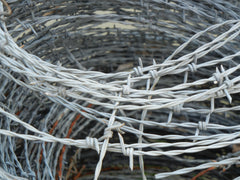Barbed Wire: Inappropriate for Horses
Posted by Austin Allgaier at
Barbed wire fencing is inappropriate for horses, period. Barbed wire fencing has been used for years for horses, cows, sheep, and even pigs. So why is it inappropriate all of a sudden?
The very design of barbed wire fencing is inappropriate for animals, particularly horses, as it is designed to hurt. Barbed wire fencing is a thin pair of steel strands that have two to four sharp points sticking out at regular intervals.
These sharp barbs are designed to poke anything that touches them to discourage the animal going through the fence. While this is still widely accepted for cattle in the United States, many countries have moved towards more humane containment methods.
Barbed Wire Never Was Appropriate
 Barbed wire has never been appropriate for horses despite years of use for this purpose. It may have seemed like it has worked, simply because you have not run into any issues with it, but hundreds of horses have been injured over the years due to this inadequate fencing material.
Barbed wire has never been appropriate for horses despite years of use for this purpose. It may have seemed like it has worked, simply because you have not run into any issues with it, but hundreds of horses have been injured over the years due to this inadequate fencing material.
Like many things, unfortunately we had different standards of care years ago when it came to our animals. Many years ago it was appropriate to simply shoot your dog if they got sick instead of having them go to a vet. Was this right? No, but it was common practice and widely accepted.
Why No Barbed Wire?
Horses are very sensitive animals both physically and emotionally. They are herd animals that are designed to run when startled and are not designed to sustain significant damage. This, combined with a field fenced in thin, virtually invisible barbed wire, is a recipe for disaster.
When a horse is familiar with its field will not often test its fencing. They are quite happy to avoid brushing up against it whether it will hurt them or not. However, when they are scared, wanting into another field, or interacting with a horse on the other side, fences often get ignored. This can lead to a horse's leg, neck or other body part getting tangled or cut. Barbed wire fencing has the ability to shred a horse in the blink of an eye and when they struggle the damage only gets worse. These lacerations can lead to stitches, permanent damage, or even death.
You may wonder why this type of barbaric fencing still being used? Often it comes down to finances, existing fencing, a lack of education, or a combination of those.
Barbed wire fencing is cheap. It is also readily available at many farm supply stores where the staff is often more concerned about the sale rather than the welfare of the animals. This is, unfortunately, why many people put it up in the first place.
There are a number of alternatives to barbed wire that are much safer and some even just as economic. Most electric fencing products can be just as easy to install and can sometimes be cheaper in the long run. Premium products like Centaur Fencing are built specifically with horses’ safety in mind.
But I’ve Already Got Barbed Wire
When you purchase a property that already has barbed wire fencing, it is quite the task to remove it. It is also quite expensive to do this as you not only have to remove all the old fencing while sustaining a few scratches and lacerations, but you also have to replace the fencing with something else. Many times this can end up costing thousands of dollars for a mere 10 acres.
Unfortunately, the biggest issue with barbed wire fencing being used is the lack of education. Since barbed wire fencing has been used for more than a century, many people don't see the point in changing it. After all, animals are just animals, right? It is these people who are the most reluctant to change their ways and will simply mend a barbed wire fence with more barbed wire rather than change what has worked for them in the past.
Thankfully, many people are paying attention to this issue, and there have been some changes to the use of barbed wire fencing in the horse world. There are many educational sites warning about the dangers of barbed wire fencing when used around horses, and some places are looking at banning barbed wire fencing altogether.
See more info: http://www.horsechannel.com/horse-keeping/fencing-mistakes.aspx
Changes & The Future
There has also been a change when purchasing horses. Most rescues will not approve you if there is any barbed wire on the property, not just the areas where the horse is to be kept. Many sellers will also ask about your fencing and require a change if necessary.
Here at Gallagher Fence (http://www.gallagherfence.net/) we sell a number of electric fencing products that are safe for horses and all other kinds of livestock.
This is why you should replace any fencing on your property with horse-safe alternatives such as vinyl, plank, round steel, or even woven wire "no climb" fencing.
Regardless of the fencing that you decide to use, all fences for horses should be easily seen by a horse when running so that they can safely avoid hazardous contact and a costly veterinary bill.
Share this post
0 comments

